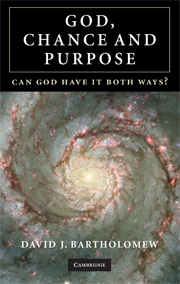Book contents
- Frontmatter
- Contents
- List of figures
- Preface
- 1 What is the problem?
- 2 What is chance?
- 3 Order out of chaos
- 4 Chaos out of order
- 5 What is probability?
- 6 What can very small probabilities tell us?
- 7 Can Intelligent Design be established scientifically?
- 8 Statistical laws
- 9 God's action in the quantum world
- 10 The human use of chance
- 11 God's chance
- 12 The challenge to chance
- 13 Choice and chance
- 14 God and risk
- References
- Further reading
- Index
7 - Can Intelligent Design be established scientifically?
Published online by Cambridge University Press: 05 June 2012
- Frontmatter
- Contents
- List of figures
- Preface
- 1 What is the problem?
- 2 What is chance?
- 3 Order out of chaos
- 4 Chaos out of order
- 5 What is probability?
- 6 What can very small probabilities tell us?
- 7 Can Intelligent Design be established scientifically?
- 8 Statistical laws
- 9 God's action in the quantum world
- 10 The human use of chance
- 11 God's chance
- 12 The challenge to chance
- 13 Choice and chance
- 14 God and risk
- References
- Further reading
- Index
Summary
Intelligent Design has been proposed as a credible scientific alternative to the theory of evolution as an explanation of life on earth. Its justification depends on an extension of Fisherian significance testing developed by William Dembski. It is shown, in this chapter, that there is a fatal flaw in the logic of his method, which involves a circularity. In order to construct a test to detect design and ‘eliminate’ chance, one has to know how to recognise design in the first place. Dembski's calculation of the probability required to implement the method is also shown to be erroneous.
WHAT IS THE ARGUMENT ABOUT?
Intelligent Design is at the centre of one of the fiercest debates currently taking place in the science and religion field. Its proponents claim that the scientific establishment is set on an atheistic course by refusing to countenance the possibility that the world might contain evidence of design. All they ask is that design should not be arbitrarily ruled out from the start and that nature should be allowed to speak for itself; no special privileges are asked for. The whole debate should then take place within the bounds of science and according to its principles of rationality.
The opponents will have none of this, claiming that Intelligent Design makes no claims that can be tested empirically and, because it cannot be falsified, it is not science. Many see it as crypto-creationism masquerading under the guise of science.
- Type
- Chapter
- Information
- God, Chance and PurposeCan God Have It Both Ways?, pp. 97 - 115Publisher: Cambridge University PressPrint publication year: 2008



